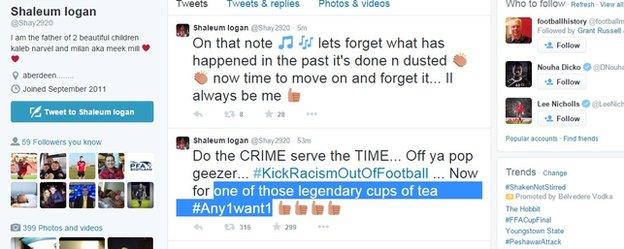Celtic: Aleksandar Tonev loses appeal against racial abuse ban
- Published

Aleksandar Tonev is on a season-long loan at Celtic from Aston Villa
Celtic's Aleksandar Tonev has lost his appeal against a seven-match ban for racially abusing Aberdeen's Shay Logan.
A Scottish Football Association appeal tribunal has upheld October's original guilty verdict against the Bulgarian.
It was revealed that the original decision had been based on the belief that Logan, 26, was a more reliable and convincing witness than Tonev, 24.
Celtic had challenged both the decision and the length of the suspension handed out to the on-loan Aston Villa winger.
The SFA states that Tonev's seven-match ban will be applied immediately, although one match has already been served by the player who moved to Glasgow on a season-long loan in August.
English defender Logan reacted on Twitter by saying: "Do the crime, serve the time. Off ya pop geezer. #KickRacismOutOfFootball.
"On that note, let's forget what has happened in the past. It's done n dusted. Now time to move on and forget it. I'll always be me."
Celtic statement: |
|---|
"Celtic Football Club is extremely disappointed by the outcome of the Scottish FA's appeal tribunal. We will be approaching the Scottish FA to seek to address this issue." |
The original tribunal's findings revolved around Logan's claim that Tonev had used the word "black" while swearing at him during a Scottish Premiership match at Celtic Park in September.
Celtic said they will continue to give the player their "full support" and hinted that they will further challenge the decision.
"We do not consider that any player should be found guilty of such a grave offence on the basis of the evidence presented in this case," said the Scottish champions, who confirmed they will approach the SFA to discuss the issue further.
"We would like to make it clear that at no stage was it ever suggested that Shay Logan had made any false allegations.

Shay Logan tweeted his response to the SFA's tribunal's decision
"However, Aleksandar Tonev's position consistently has been that he did not say the words that were alleged to have been said and that he is not a racist."
Aston Villa, like Celtic, said racism was "abhorrent" and had no place in football but also stood by their player's insistence that he did not utter the words alleged.
The Bulgarian FA said it was "very disappointed" to hear that the ban had been upheld. In a statement it said: "We still believe in Tonev's innocence, bearing in mind the fact that the player has never showed before any racist behaviour on and off the pitch".
During the match, Logan complained to referee Bobby Madden that Tonev had made a racist remark towards him and also reported it to Dons captain Mark Reynolds.
The 4 December appeals tribunal heard submissions on the Bulgarian's behalf as he challenged the suggestion that he had used "offensive, insulting and abusive language of a racist nature".
Celtic argued that the tribunal had failed to give Tonev a fair hearing, that it was entitled to reach its decision based on the facts and that the period of suspension imposed was excessive.
SFA judicial panel appellate tribunal |
|---|
"Having made allowance for the impact of anxiety upon him, the tribunal were unable to accept Mr Tonev as either credible or reliable." |
In making its findings public, the appeals tribunal pointed out that there were "two inconsistent accounts" and that the original panel had to decide who they considered to be right on "the balance of probabilities".
"They stated that they believed Logan, found him to be a reliable witness and gave cogent reasons for doing so," the report said of the original panel.
It added that the Englishman "impressed them by the careful and measured manner in which he gave his evidence" and that his testimony was consistent with that of other witnesses and with video evidence.
It was pointed out that Tonev, who had rejected the opportunity to use an interpreter, had not been as convincing.
"Having made allowance for the impact of anxiety upon him, the tribunal were unable to accept him as either credible or reliable," read the report.
"They have explained that he gave his evidence in a guarded and hesitant manner and that his evidence on the understanding of the language that had been used was particularly unsatisfactory."
- Published2 December 2014

- Published26 November 2014

- Published5 November 2014

- Published4 November 2014

- Published2 November 2014

- Published30 October 2014

- Published15 September 2014

- Published11 August 2014

- Published20 June 2016

- Published7 June 2019
